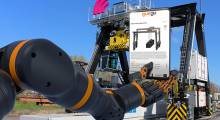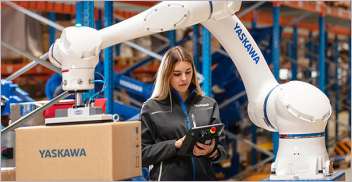Jeff Burnstein
Title: President, the Association for Advancing Automation (A3)
Location: Ann Arbor, Mich.
Experience: President for eight years and has been with the association for 32 years.
Modern: Tell us about A3.
Burnstein: A3 is the parent group for the Robotic Industries Association (RIA), the Automated Imaging Association (AIA) and the Motion Control Association (MCA). We represent more than 800 companies that provide automation solutions and our mission is to promote the reasons why companies should automate.
Modern: How do you sum up the state of automation today?
Burnstein: Automation is booming everywhere and in all industries, not just manufacturing. Companies realize that to compete in the global marketplace, they have to automate. For instance, China is the fastest adopter of robotics. The Chinese are now under the same pressure around speed to market as everyone else. What’s more, large companies are demanding great quality, regardless of where they do business. The cost of poor quality outweighs the cost of the automation.
Modern: Traditionally, the justification for automation has been a reduction in labor. Is that still the case?
Burnstein: The cost of labor is one part of the discussion. However, there are other factors today. In the United States, we are automating to reshore production because companies fear losing their intellectual property when they outsource. They also want to be closer to their markets to reduce delivery times. Political instability is another factor. In fact, if you look closer at the jobs discussion, you have to consider that automation is helping to save jobs. A lot of companies tell us they wouldn’t be in business without automation.
Modern: Can you tell us more about the state of the robotics market?
Burnstein: The market for robotics is growing globally. The automotive industry continues to be a big driver, and now their Tier 1 suppliers are adopting robotics, too. Beyond that, we’re seeing a new type of robot emerge that can work side by side with people. We call that collaborative robotics. This is allowing robots to go into new environments such as retail, entertainment and medical. Nothing is more collaborative than a robot involved in your surgery. But, it is also opening robotics up for new applications in traditional markets, like final assembly in automotive. Another emerging area is mobile robotics, where we put the robot on a mobile base or create devices that have mobility. We’re not there yet, but that’s where we’re headed.
Modern: One of the criticisms of automation in general, and robotics in specific, is that it causes job loss. Based on your earlier answer about robots saving jobs, how do you view that issue?
Burnstein: We believe the drop in prices and advances in technology are going to make robotics applicable to many, many industries. That does make people concerned about jobs. What’s interesting to me is that the unemployment rate is coming down even as the sale of robotics is growing. There are a record number of job openings in the United States. We really think the biggest impediment to the growth is that there aren’t enough qualified people who can do these jobs. In fact, the robotics industry will create jobs for people who can install, run and maintain robots.
About the Author
Follow Robotics 24/7 on Linkedin
About the Author
Follow Robotics 24/7 on Linkedin
Article topics
Email Sign Up















